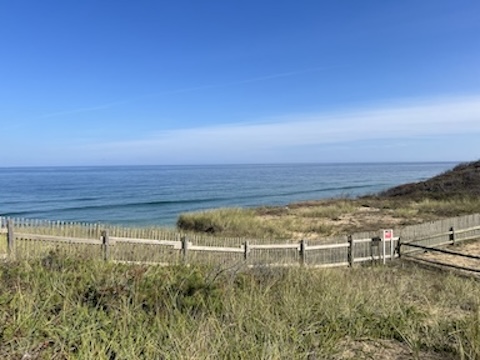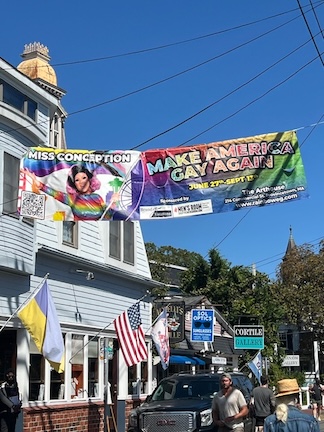Earlier this month, Hank and I were on the Cape, camping at Wellfleet Hollow State Campground, our second time. The last was in 2021. September can be chilly at night, but that means a nearly empty campground, restaurants with available tables, and tolerable traffic. It was a good time to get away from my computer screen and the book I’m writing. Here are some observations.
A LITTLE HISTORY: We have camped at many National Parks, and each time, I am grateful the U.S. preserved these special lands and keeps them open to the public. The Cape Cod National Seashore, established in 1961 by President John F. Kennedy, has 43,607 acres stretched over six towns — from Chatham to Provincetown — and 40 miles of shore facing the Atlantic.
SEPTEMBER: Growing up in Fairhaven, I recall the heavy traffic around Labor Day Weekend as people fled the Cape. That congestion eased when the state added a highway. Over the years more people have chosen to live there full-time although it remains a huge vacation spot. A woman visiting our village said she hates living in Wellfleet in August because of the crowds. September is better.
WEATHER: The high was 72. The low was in the 50s. We brought two sets of sleeping bags and on the third night finally figured out which arrangement worked best.
FOOD: Eating in restaurants was a lot more expensive than our last time. Our first night at what was definitely not a fancy place, we ordered two oyster Po’ boys, a salad we shared, a beer, and a skimpy glass of wine. The total was $90. The best food was the most reasonable — shrimp tacos for lunch at Tin Pan Alley in P-Town, where the maître-de gave us a great seat on the patio facing the beach, and PB Boulangerie Bistro in Wellfleet, where we opted for almond croissants. A memorable sight: men carrying huge trays of dishes and glasses one-handed over their heads.
OCEAN: We visited four National Seashore beaches, plus ones at Wellfleet Harbor. That’s Nauset Light Beach above. Significant waves attracted surfers. The ocean’s temperature was tolerable but the undertow on certain beaches a bit intimidating. Seals entertained as they floated in the ocean, seemingly as curious about humans as we were of them. Of course, where there are seals there are sharks. Bar-dum, bar-dum, bar-dum, bar-dum….
UNEXPECTED BONUS: We got to see our granddaughters as their parents happened to be attending a no-kid-allowed birthday party in Wellfleet. We got together for dinner and breakfast.
DRIVING: We did spend time in our car going from one spot to another. Hank was the designated driver.
PORTA-JOHNS: The Outer Cape had portable toilets everywhere, surprisingly clean. I liked the sign inside one: “We aim to please. And we ask you to do the same.”
P-TOWN: We went to Provincetown four times. The Pilgrims dropped anchor here for almost six weeks before floating onto Plymouth. Since then, the town has attracted so many creative people. It has a sizable Portuguese population, originally drawn by the area’s fishing industry. Restaurants often have a Portuguese dish like Kale Soup. (I was happy to share malassadas from the Provincetown Portuguese Bakery with our granddaughters who spent the day with us.) Of course, the town has a significant gay population — and visitors. I was amused by the sign strung across Commercial Street: “Make American Gay Again.”
Commercial Street is full of shops, many tourist-oriented, many featuring local art. People walked in the street and moved aside or not for vehicles and bikes. Our favorite: Yesterday’s Treasures. Our last time, we bought a signed and dated R.C. Gorman print that would have sold for far more in Taos. Commercial Street is also a great place for people-watching with so many well-groomed male couples, drag queens dressed in sparkly nun costumes, plus tourists of all ages and sizes.
CAMPING: Sleeping in a tent is a cheap way to sleep. Our five nights cost around a hundred bucks. The bathrooms were a two-minute walk and the showers, free. We had black coffee, scones I brought from home, and instant oatmeal for breakfast. Basically, I boiled water on the propane camp stove. The rest of the meals we ate out. There are, of course, disadvantages like having to get up in the middle of the night. And our air mattress definitely needs an upgrade. The campground had a sizable amount of vocal coyotes. One morning wild turkeys and crows were engage in a loud argument. Ah, they were all part of the experience.

